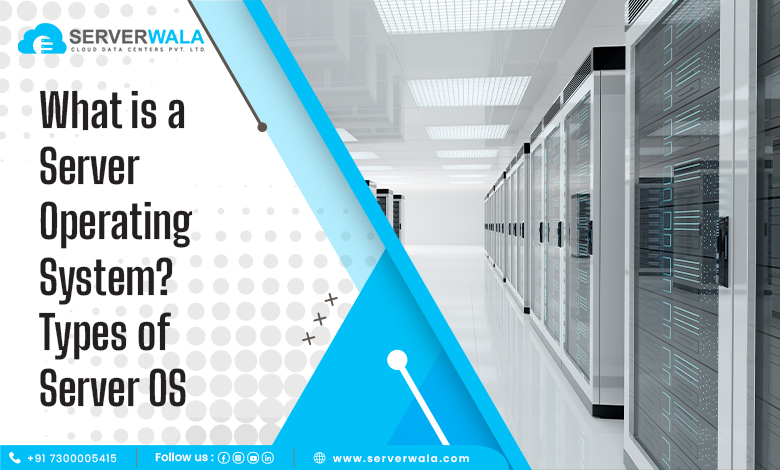What is a Server Operating System? Types of Server OS

Introduction
It is important to note that there are distinct differences between a desktop operating system and a server operating system. The purpose of each operating system is unique – one is designed for personal desktop use, while the other is specifically meant to manage servers in a data center.
If you’ve ever wondered how multiple users are handled on a server with an operating system, we’ve got you covered. Our comprehensive article on server OS delves into the various types of server operating systems available. We’ll provide you with valuable insight into the best operating systems for businesses of different sizes so that you can make an informed decision.
What is a Server Operating System?

For most of us, personal computers are an integral part of our daily lives. They help us manage our software and hardware needs, allowing us to interact with them more efficiently. However, a server operating system is essential when it comes to managing multiple users and resources like memory, power, and security. This system ensures that every user has access to the resources required while maintaining stability and security. It acts as a mediator between the user and the server, providing a smooth and efficient connection.
Did you know that the installation and updates of security-related software are managed through server operating systems? It’s the same security that you need to protect your data from being hacked. Let’s take a closer look at some common server operating systems.
Linux operating system
Looking for an open-source operating system that’s highly compatible and customizable for managing servers? Consider Linux, which has a large community and readily available source. With this server operating system, you can interact with the server through text commands. If your server has resource-intensive applications, Linux is a great option. Check out the many Linux distros available for a quick overview of your options.
Ubuntu
Ubuntu is a popular and easy-to-use operating system based on Debian Linux. It is regularly updated and has a strong community of supporters.
CentOS
CentOS is a free and reliable operating system that is often used for enterprise applications and servers. It’s similar to Red Hat Enterprise Linux and provides long-term support and updates for companies and institutions.
Debian
Debian Linux is a well-known distribution that values free and open-source software. It has many packages and good management, so it’s popular for servers, desktops, and devices. It’s stable and can be used for different kinds of computing needs. Other Linux distributions, like Ubuntu, are based on Debian.
Windows operating system
One of the leading tech companies in the world, Microsoft, has created a widely acclaimed and extensively utilized server operating system known as Windows. This powerful platform is the go-to choice for developers who require high-performance server-based applications. With pre-installed versions for domain and web hosting, Windows offers a seamless hosting experience. The security software of this operating system is regularly updated to guarantee its users’ safety and security.
macOS
The system that runs Apple’s Mac computers is called macOS. It helps the computer work smoothly and do many tasks like browsing the internet, making documents, and playing games. Macs are made to work with macOS, and it has a nice and easy-to-use design.
FreeBSD operating system
FreeBSD is an exceptional operating system that is both highly capable and free of cost. It is comparable to other popular operating systems like Windows and macOS, but it is specifically designed for use on computers and servers that operate on the FreeBSD system.
Acting as the brain and backbone for these devices, FreeBSD provides a strong and reliable foundation, ensuring the smooth and efficient operation of your computer or server. With FreeBSD, you can easily accomplish a wide range of tasks, including browsing the internet, sending emails, creating documents, and running robust server applications. In essence, FreeBSD is an incredibly dependable tool that enables you to achieve your computing goals with ease.
Netware operating system
Novell’s NetWare server operating system was a game-changer in its time, overseeing computer networks like an efficient and intelligent conductor. It facilitated communication and data sharing among all devices and computers in the network. While it may not be as widely used today, we can reflect on its contributions and the advancements it brought to the world of technology.
Best Server OS for Businesses

By selecting the right combination of operating system and server, you can enhance your experience and enjoy top-notch performance. With a server operating system that suits your needs, you can easily manage IT support, obtain state-of-the-art data security, and foster overall business growth. It’s worth noting that every business has unique OS requirements based on its scope, so take a look at our categorized analysis for more information.
Small scale businesses
When it comes to selecting an operating system for a small business server, it’s crucial to take into account the budget, server type, and proficiency of the maintenance team. If you have the financial resources to invest in a server OS, ‘Windows Server Essentials’ emerges as an excellent choice for companies that have fewer than 25 users and a small maintenance team.
This OS has a user-friendly interface, supports third-party apps, and offers a plethora of features, including email clients, remote access, mobile device support, file and printer sharing, backup and restore, and much more. It’s a comprehensive solution that ensures seamless connectivity for your business at a reasonable cost.
Medium-scale businesses
Selecting the right operating system is crucial for the growth of any medium-sized business. If you’re looking for scalability, server operating system Linux distributions are an excellent choice.
Ubuntu Server, in particular, is a reputable and stable operating system that’s free and user-friendly. Being an open-source platform, it provides extensive customization options that allow you to tailor it to your business requirements with ease. You can also go for macOS or FreeBSD OS if you want proper stability and performance.
Large-scale businesses
When making a decision on the ideal operating system for a sizable business, it is crucial to take into account the type of server and its intended purpose. For example, a Windows server operating system would be a fitting choice for a file server, authentication server, or email server within an active directory domain.
On the other hand, both Windows and Linux would be feasible options for a web server. It is important to thoroughly evaluate each option to ensure that the chosen operating system aligns with the specific needs and requirements of the business.
Also Read: Web Hosting Requirements for E-Commerce Websites
Conclusion
A server operating system is a special kind of software that helps manage servers in data centers. It helps make sure everything runs smoothly, keeps things secure, and makes it possible for many people and applications to use the servers at once. There are different kinds of server operating systems to choose from. Linux operating systems like Ubuntu, CentOS, and Debian are popular because they’re open-source and can be customized.
Windows server operating system is suitable for businesses that need high-performance applications and hosting. macOS Server works well for businesses that use Apple devices. FreeBSD is a robust and reliable option for many different server tasks. NetWare used to be an essential server operating system, but it’s not used as much anymore.
Choosing the right server operating system is important for IT support, data security, and business growth. It’s essential to pick an OS that fits the organization’s needs and objectives.





